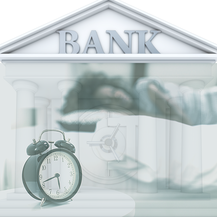|
3/13/2023 Do you have a “sleep bank” mentality? How much sleep do you really need? The World Health Organization recommends 8 hours of sleep per night, consistent with the National Institutes of Health recommendation of 7-9 hours per night. These essential hours help us recover from life's pressures and stresses and promote deep health. For example, sleep is vital for maintaining a healthy weight, reducing stress, and keeping the immune system strong. It helps to heal and repair the heart and blood vessels to lower the risk of heart disease. Sleep improves attention and concentration and assists in converting short-term memories into long-term memories (NHLBI, 2022). No wonder Precision Nutrition calls sleep a “recovery rockstar!” Have you ever stayed up too late? Cheated yourself of sleep? Perhaps you stay up late to work on projects for work or school or to spend time with friends. You justify the loss of sleep by telling yourself, “That’s okay. I will go to bed early tomorrow night. Or, perhaps, you promise yourself, “I will sleep in this weekend.” Unfortunately, sleep science reveals that we can’t create a sleep debt and then repay it (Walker, 2021). Every time we shortchange our sleep, we impact our health. When we do this regularly, there are real consequences.
 How will you know that your sleep debt is impacting you? Look for the following tell-tale signs that your sleep habits affect your overall health.
Good news! Even though you can’t repay your “sleep debt,” you can start feeling better soon by improving your sleep habits now. Strive for 8 hours of sleep each night to boost mood and energy, stabilize weight, facilitate memory and learning, support a healthy immune system, and more. Refer to last year’s blog post for simple tips to improve your sleep. Invest in your sleep for short-term and long-term benefits.
Improve your sleep, not only for yourself but for those around you. Alert, focused, healthy, happy, and energetic adults are the best brain architects (aka learning facilitators and caregivers). References and Resources: Hyman, M. (2023). Young Forever: The secrets to living your longest, healthiest life. Little Brown Spark: NY Dr. Mark Hyman. Why Sleep is More Important Than Diet-Optimize it Today! Podcast Episode 487 Walker, M. ( 2018). Why we sleep: Unlocking the power of sleep and dreams. Scribner: NY Precision Nutrition. Hacking Sleep www.precisionnutrition.com/hacking-sleep Comments are closed.
|
Author: Karin H. Spencer, EdD, NCPTThanks for visiting the Uplift Blog! I'm an educator, Pilates enthusiast (NCPT), reflective practitioner and Ironman triathlete. I love helping others discover their joy and confidence as movers. I support others in making lifestyle changes to improve health and well-being. As a life-long educator, I am especially committed to joining together with teachers to uplift each other. Archives
May 2023
Categories TERMS AND CONDITIONS PRIVACY POLICY DISCLAIMER
c 2022 All Rights Reserved Education and Wellness Consulting, LLC |
Search by typing & pressing enter



 RSS Feed
RSS Feed